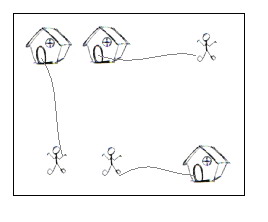poj 2195//hdu 1533 Going Home 最小费用流(spfa)
来源:互联网 发布:ubuntu debian 知乎 编辑:程序博客网 时间:2024/06/05 04:15
Language:
Going Home
Time Limit: 1000MS Memory Limit: 65536KTotal Submissions: 18601 Accepted: 9500
Description
On a grid map there are n little men and n houses. In each unit time, every little man can move one unit step, either horizontally, or vertically, to an adjacent point. For each little man, you need to pay a $1 travel fee for every step he moves, until he enters a house. The task is complicated with the restriction that each house can accommodate only one little man.
Your task is to compute the minimum amount of money you need to pay in order to send these n little men into those n different houses. The input is a map of the scenario, a '.' means an empty space, an 'H' represents a house on that point, and am 'm' indicates there is a little man on that point.

You can think of each point on the grid map as a quite large square, so it can hold n little men at the same time; also, it is okay if a little man steps on a grid with a house without entering that house.
Your task is to compute the minimum amount of money you need to pay in order to send these n little men into those n different houses. The input is a map of the scenario, a '.' means an empty space, an 'H' represents a house on that point, and am 'm' indicates there is a little man on that point.

You can think of each point on the grid map as a quite large square, so it can hold n little men at the same time; also, it is okay if a little man steps on a grid with a house without entering that house.
Input
There are one or more test cases in the input. Each case starts with a line giving two integers N and M, where N is the number of rows of the map, and M is the number of columns. The rest of the input will be N lines describing the map. You may assume both N and M are between 2 and 100, inclusive. There will be the same number of 'H's and 'm's on the map; and there will be at most 100 houses. Input will terminate with 0 0 for N and M.
Output
For each test case, output one line with the single integer, which is the minimum amount, in dollars, you need to pay.
Sample Input
2 2.mH.5 5HH..m...............mm..H7 8...H.......H.......H....mmmHmmmm...H.......H.......H....0 0
Sample Output
21028
Source
Pacific Northwest 2004
题意:n*m的图上有若干个人‘m’和房屋‘H’,人每走一步消耗一块钱,现在要让所有的人都进到房子去,一人一间房,问最小的费用是多少。
思路:最小费用流,添加超级源点和超级汇点建图,我用的spfa版费用流算法。
代码:
#include <iostream>#include <cstdio>#include <cstring>#include <algorithm>#include <cmath>#include <string>#include <map>#include <stack>#include <vector>#include <set>#include <queue>#pragma comment (linker,"/STACK:102400000,102400000")#define mod 1000000009#define INF 0x3f3f3f3f#define pi acos(-1.0)#define eps 1e-6#define lson rt<<1,l,mid#define rson rt<<1|1,mid+1,rtypedef long long ll;using namespace std;/*最小费用最大流,求最大费用只需要取相反数,结果取相反数即可。点的总数为N,点的编号0~N-1*/const int MAXN = 300;const int MAXM = 100000;struct Node{ int x,y;}H[MAXN],M[MAXN];struct Edge{ int to,next,cap,flow,cost;}edge[MAXM];int head[MAXN],tol;int pre[MAXN],dis[MAXN];bool vis[MAXN];int N,n,m;void init(int n){ N=n; tol=0; memset(head,-1,sizeof(head));}void addedge(int u,int v,int cap,int cost){ edge[tol].to=v; edge[tol].cap=cap; edge[tol].cost=cost; edge[tol].flow=0; edge[tol].next=head[u]; head[u]=tol++; edge[tol].to=u; edge[tol].cap=0; edge[tol].cost=-cost; edge[tol].flow=0; edge[tol].next=head[v]; head[v]=tol++;}bool spfa(int s,int t){ queue<int>q; for (int i=0;i<N;i++) { dis[i]=INF; vis[i]=false; pre[i]=-1; } dis[s]=0; vis[s]=true; q.push(s); while (!q.empty()) { int u=q.front(); q.pop(); vis[u]=false; for (int i=head[u];i!=-1;i=edge[i].next) { int v=edge[i].to; if (edge[i].cap > edge[i].flow && dis[v] > dis[u] + edge[i].cost) { dis[v]=dis[u] + edge[i].cost; pre[v]=i; if (!vis[v]) { vis[v]=true; q.push(v); } } } } if (pre[t]==-1) return false; else return true;}//返回的是最大流,cost存的是最小费用int minCostMaxflow(int s,int t,int &cost){ int flow=0; cost=0; while (spfa(s,t)) { int Min=INF; for (int i=pre[t];i!=-1;i=pre[edge[i^1].to]) { if (Min > edge[i].cap-edge[i].flow) Min=edge[i].cap-edge[i].flow; } for (int i=pre[t];i!=-1;i=pre[edge[i^1].to]) { edge[i].flow+=Min; edge[i^1].flow-=Min; cost+=edge[i].cost*Min; } flow+=Min; } return flow;}int main(){ char ch; while (scanf("%d%d",&n,&m)&&(m||n)) { int hh=1,mm=1; getchar(); for (int i=1;i<=n;i++) { for (int j=1;j<=m;j++) { scanf("%c",&ch); if (ch=='H') { H[hh].x=i; H[hh++].y=j; } else if (ch=='m') { M[mm].x=i; M[mm++].y=j; } } getchar(); } N=hh+mm+2; init(N); mm--,hh--; for (int i=1;i<=mm;i++) addedge(0,i,1,0); for (int i=1;i<=hh;i++) addedge(i+mm,N-1,1,0); for (int i=1;i<=mm;i++) { for (int j=1;j<=hh;j++) { int x=abs(M[i].x-H[j].x)+abs(M[i].y-H[j].y); addedge(i,j+mm,1,x); } } int ans; int y=minCostMaxflow(0,N-1,ans); printf("%d\n",ans); } return 0;}/*2 2.mH.5 5HH..m...............mm..H7 8...H.......H.......H....mmmHmmmm...H.......H.......H....0 0*/ 3 0
- poj 2195//hdu 1533 Going Home 最小费用流(spfa)
- POJ 2195:Going Home(SPFA最小费用最大流)
- hdu 1533 || poj 2195 Going Home (最小费用最大流)
- POJ 2195 & HDU 1533 Going Home(最小费用最大流)
- poj 2195 zoj 2404 hdu 1533 Going Home(最小费用流)
- POJ 2195 && HDU 1533 Going Home(最小费用最大流-mcmf)
- POJ 2195 Going Home <最小费用流>
- POJ 2195 Going Home 最小费用流
- hdu 1533 Going Home 最小费用流
- HDU 1533 Going Home 最小费用流
- Going Home (hdu 1533 最小费用流)
- HDU 1533 Going Home(最小费用流)
- hdu 1533 Going Home (最小费用流)
- poj 2195 Going Home--最小费用最大流--spfa--动态数组--或者用 最小权匹配
- poj - 2195 - Going Home(最小费用最大流)
- poj 2195 Going Home(最小费用最大流)
- Going Home POJ 2195 (最小费用最大流)
- POJ 2195Going Home(最小费用最大流)
- 学习数组(二)
- MapReduce练习(三)
- linux的简单shell脚本包括数组和条件判断
- Xamarin.Android 如何使用Assets目录下的文件
- JAVA中的接口和抽象类(转)
- poj 2195//hdu 1533 Going Home 最小费用流(spfa)
- error: src refspec XXX matches more than one
- 基于TMS320DM814xDaVinci 中VPSS(视频处理子系统)分析
- codeforces 327C Magic Five
- 执行pod install还是pod update都卡在了Analyzing dependencies不动
- nmap推荐扫描选项
- maven tomcat plugin 热部署
- nginx--linux下安装nginx
- log4j的MDC,DNC配置以及应用


